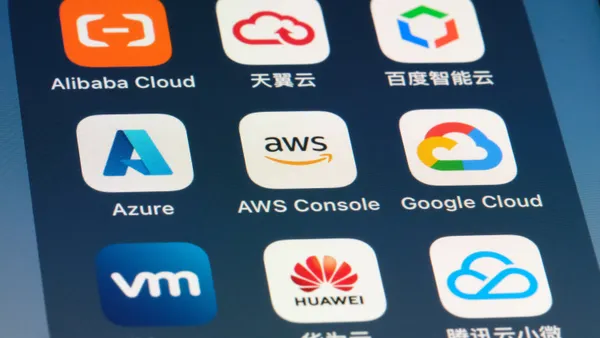Dive Brief:
- AWS updated its technology partner program policies to curb the transfer of Reserved Instances and Saving Plans discounts from third-party providers, effective June 1, the company confirmed to CIO Dive.
- “AWS Reserved Instances (RIs) and Savings Plans (SPs) were designed to provide significant savings for a single end customer’s long-term steady state AWS usage,” an AWS spokesperson said in an email. “We are making an update to our RI and SP policy to clarify these terms.”
- While AWS partners will still be able to purchase cloud discounts on behalf of an end user, those credits will have to be in the customer’s name and appear on the customer’s bill, Spencer Pingry, CTO and cofounder of cloud cost management firm Cloud Capital, told CIO Dive. “When you buy a commitment, you have to buy it with an end customer in mind, and when you buy a commitment in an account, you can't move that account around,” Pingry said.
Dive Insight:
As hyperscalers grow their marketplaces, AWS has retooled its guidelines to clarify policies for buyers and sellers. Restrictions on discount credit transfers are a way to give end users greater visibility into spending by separating the cloud costs from third-party provider fees.
“This will create more transparency,” said Pingry. “End customers now know that they bought specific commitments with a certain discount rate and there's no layer in between that influences what the end customer sees on their bill.”
Earlier this year, AWS took steps to tighten its discount policies and open its marketplace to a broader number of providers. As of May 1, customers can only apply cloud discounts to products that run entirely on AWS infrastructure. Vendors that meet the new criteria carry a special marketplace badge.
AWS notified partners of the changes in the fall and sent a reminder of the cloud credit resale policy last month to ease the transition, the company said.
The policy primarily affects vendors that bundle services with cloud. Enterprise customers are further down the food chain but may need to take action to maintain cloud discounts, according to Pingry.
“Every partner is handling this differently,” he said. “If I were a CIO or a CFO using an SMP or reseller or vendor that does optimization, I would be asking them about the change to make sure you know what the impact on your cloud bill is going to be.”
Smarter provisioning remains a key to reining in cloud costs, according to a Cast AI analysis of hyperscaler workloads across 2,100 organizations published in March. The Kubernetes automation platform provider found acute underutilization of cloud compute and storage resources last year.
The policy change is an opportunity for companies that have existing commitments to AWS to burn through any unused capacity they’ve provisioned, Pingry said.
Enterprises can also use marketplace billing, which bundles cloud, SaaS and other technology services costs, as an IT spending management tool, FinOps Foundation Executive Director J.R. Storment told CIO Dive.
“Third-party software purchases through cloud marketplaces have been in the purview and visibility of FinOps teams for a while, because it often flows through on the same bill,” Storment said. “For years, teams have been asked to report on marketplace spend.”















